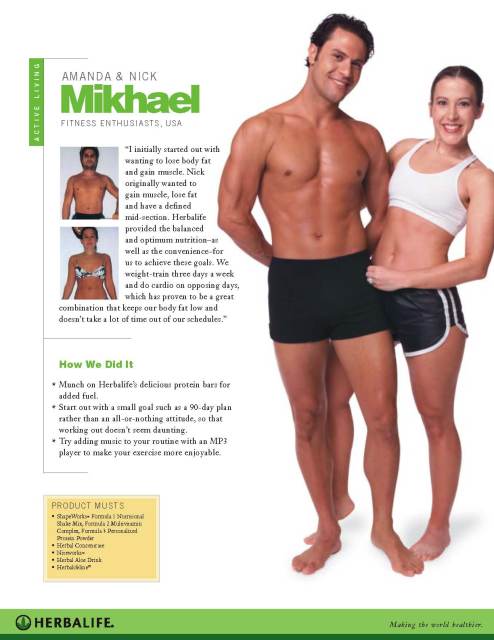diet make-up
Question
I'm trying to work out what I should be eating.
If my diet should be 15% protein, 50% carbs, and 35% fat
(according to nutrition.org.uk and the BBC), I can make up a
nearly 1200 calorie diet like this:
15g protein = 120 cal
100g carbs = 400 cal
70g fat = 630 cal
(going by 4 cal/gram for protein/carbs and 9cal/gram for fat)
The results seem weird in two ways:
1) should I really be getting the majority of my food energy from
fat?
2) is 100g carbohydrate/day enough?
Hi Rachel,
I'm not sure how you arrived at your numbers, but your calculations are not correct.
The diet you have listed (15 g protein, 100 g carbs, 70 g fat) contains a total of 1090 calories; 5% of the calories are from protein, 33% are from carbs, and 58% are from fat.
You should be aiming for 15% protein, 50-60% carbs, and 25-35% fat. Also, 1200 calories is far too low for almost any adult. Without knowing your age, height, weight, and activity level, I can't give you an accurate estimate of how many calories you need. The average 30 year old, moderately active woman needs about 2000-2200 calories per day. If you are younger or more active, you would need more than this, if you are older or less active, you would need less. I rarely recommend going below 1700-1800 calories, even for weight loss. I actually recommend avoiding calorie counting in general - it is not an effective weight-management strategy in the long term.
If you are looking to lose weight, here are some healthy strategies (most of these also apply if you are simply looking for some healthy eating guidelines):
1. Think 揾ealthy food? not calories!
Counting calories is not an effective long term strategy for promoting weight loss or maintaining a healthy weight. Instead, focus on choosing foods that are low on processing and high in nutrients such as vitamins, minerals, and dietary fibre most of the time.
2. Get Enough Calcium!
Scientific research has demonstrated that dietary calcium plays a role in weight control. Calcium helps to regular fat storage and promotes fat loss in the abdominal area.
Eating about 1000 mg of calcium per day (from food, not supplements), equates to the burning of about 100 more calories of body fat per day (or about 10 pounds of fat per year!)
Choose 8 servings from the following list to meet your daily goal:
?cup calcium fortified orange juice
?cup fortified tomato juice
1 cup cooked or 2 cups raw greens (e.g. kale, collard greens, broccoli)
?cup cow抯 milk, soy milk, or yogurt
?oz cheese
?cup calcium-set tofu
?cup almonds
2 tbsp almond butter or sesame tahini
?cup soy nuts
1 oz calcium-fortified breakfast cereal
Although 8 servings sounds like a lot, many of the serving sizes are quite small. For example, if you include ?cup of fortified orange juice as well as ?cup milk on cereal at breakfast, 1.5 oz of cheese on your sandwich at lunch, 1 cup of milk with supper, and ?cup of yogurt plus ?cup of almonds for a snack, you抳e gotten in 8 servings!
3. Eat breakfast
About 40 percent of adults skip breakfast at least 4 times per week. Don抰 be one of them! Research has demonstrated that breakfast skippers weigh more than breakfast eaters. People who eat breakfast actually consume fewer calories by the end of the day than breakfast skippers. If you are pressed for time in the morning, or don抰 feel up to eating right after you get up, pack a portable breakfast (e.g. muffin or cereal bar, fruit cup or fresh fruit, yogurt) and nibble throughout the morning.
4. Eat the RIGHT kind of carbs
Yes, carbs have been elevated to dietary demon status lately - but they shouldn抰 be. Your body needs carbohydrates to function properly. The key is to choose the right types of carbs. Steer clear of overprocessed foods like white bread, and increase your intake of healthy whole grains, fruits, and vegetables. One key benefit of healthy carbs is that they contain fibre, which helps you to feel full, so you don抰 overeat.
Good choices include:
Breads and baked goods made with whole grain flours, such as whole wheat, oats, or rye
Whole grain breakfast cereals, like Raisin Bran, Corn Bran, or Cheerios
Brown rice, couscous, barley, kamut, or millet
Fresh, frozen or canned fruits or vegetables
Legumes such as lentils, split peas, chickpeas, black beans, or baked beans
5. Beware of "Snackwell's Syndrome"
Due to the focus on low fat diets, many people have forgotten that calories count too! Just because a food is low in fat does not mean it is low in calories (often fat is replaced with more sugar). So even when consuming lower-fat versions of foods, continue to monitor your portion sizes!
6. Include adequate amounts of protein and fat
While it is not necessary (or even healthful) to consume a high-protein diet to promote weight loss, including adequate protein in your diet is important. Consuming protein foods at each meal will help you to feel satisfied for longer. Small amounts of fat can have the same effect ?just choose healthy fats like olive or canola oil, or the fat naturally present in foods such as nuts or avocadoes.
7. Avoid 搎uick fixes?br>
Although potions and pills may promise miracles, they will not deliver lasting results. You did not gain weight overnight, and you can抰 take it off overnight either! Studies show that people who lose weight quickly are likely to gain it all back. Permanent weight loss takes place much more slowly. Be patient and you will achieve your goal.
8. Set realistic goals
A safe rate of weight loss is 0.5 to 2 lbs per week. So, once you have determined your target weight, set a realistic time frame to get to your goal weight.
9. Get moving!
Regular physical activity is absolutely essential to promoting and maintaining weight loss. Much research has shown that individuals who commit to regular exercise are the ones most likely to maintain weight loss.
If the thought of physical activity intimidates you or makes you cringe, a great way to start is by purchasing a pedometer and using it daily.
A study of women aged 19-71 who walked 10,000 steps per day for 8 weeks, found that nearly half of the women reported losing weight during the 8 week period.
A pedometer increases your awareness of your daily activity level. You can purchase a basic one for about ten dollars. Start out by keeping track of how many steps you are currently taking per day, then aim to add 1000-2000 steps per day until you hit 10,000. This is the equivalent of about 8 km (5 miles). Squeeze in more steps by taking 5 to 10 minute walking breaks several times throughout the day, taking the stairs instead of the elevator, and walking to destinations less than 1 km away.
10. Practice 揺xtreme self care?br>
Taking good care of yourself is crucial to both your weight loss success and your overall ability to live a satisfying life. Make sure to get enough sleep, and treat yourself to what your body and spirit needs ?a long, hot bath, a massage, or an evening curled up with a good book and a hot cup of tea. You are worth it!
Hope that helps!
Karen
www.getfitwithkaren.com
Related Articles
-
question about daughters eating habits
QuestionHello, I have two children a son 13, and a daughter almos
-
Entering whole chicken into nutrition calculator
QuestionSo I have a program that will calculate nutritional infor
-
Distended Abdomen
QuestionHi I have struggled with a big bloated belly most of my a
-
Hydration
QuestionI know how important it is to keep hydrated before, durin
-
Hello
QuestionQUESTION: I have a question I have this box of fiber one
-
too thin?
Questiondear leigh-anne, i am a 21 yr old female who is 5 feet 7




